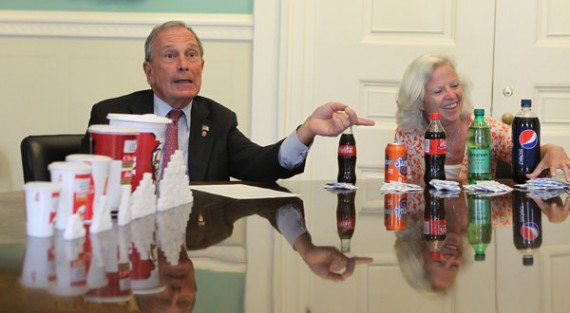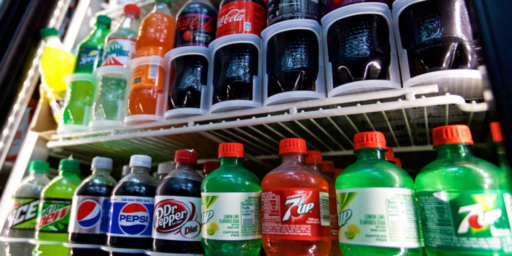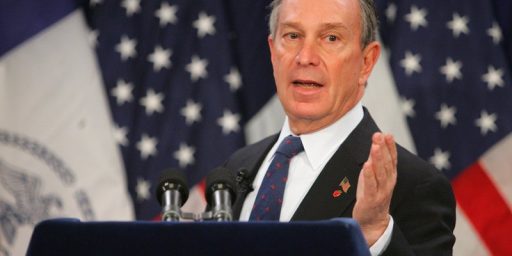Appellate Court Rules New York Large Sized Soda Ban Unconstitutional
Another legal setback for Mayor Michael Bloomberg's crusade to regulate what New York City residents can eat and drink.
Upholding an opinion issued in March by a trial court judge, an intermediate appellate court in New York has ruled that the ban on large-sized sugary drinks enacted last year by the New York City Department of Health is unconstitutional:
NEW YORK — New York City Mayor Michael Bloomberg’s controversial plan to keep large sugary drinks out of restaurants and other eateries was rejected by a state appeals court on Tuesday, which said he had overstepped his authority in trying to impose the ban.
The law, which would have prohibited those businesses from selling sodas and other sugary beverages larger than 16 ounces (473 ml), “violated the state principle of separation of powers,” the First Department of the state Supreme Court’s Appellate Division said.
The decision, upholding a lower court ruling in March that struck down the law, dealt a blow to Bloomberg’s attempt to advance the pioneering regulation as a way to combat obesity. Beverage makers and business groups, however, challenged it in court, arguing that the mayoral-appointed health board had gone too far when it approved the law.
A unanimous four-judge panel at the appeals court agreed, finding that the board had stepped beyond its power to regulate public health and usurped the policy-making role of the legislature.
In particular, the court focused on the law’s loopholes, which exempted businesses not under the auspices of the city’s health department and left certain drinks, such as milk-based beverages, unaffected.
As a result, grocery and convenience stores – such as 7 Eleven and its 64-ounce Big Gulp – were protected from the ban’s reach, even as restaurants, sandwich shops and movie theaters were not. Meanwhile, milkshakes and high-calorie coffee drinks like Starbucks’ Frappucinos would have remained unfettered.
“The exceptions did not … reflect the agency’s charge to protect public health but instead reflected the agency’s own policy decisions regarding balancing the relative importance of protecting public health with ensuring the economic viability of certain industries,” Justice Dianne Renwick wrote for the court.
In a statement, Bloomberg said the decision was a “temporary setback” and vowed to appeal to the state’s highest court, the Court of Appeals. If the court declines to hear the city’s appeal, the case would come to an end.
Bloomberg also said that more than 2,000 New Yorkers had died from diabetes since March 12, when the law was struck down just one day before it was to take effect.
The proposed ban, the first of its kind, drew national attention, as public health advocates praised the plan while critics decried Bloomberg for trying to create a “nanny state.”
A spokesman for the American Beverage Association, an industry group that served as the lead plaintiff in challenging the law, said, “With this ruling behind us, we look forward to collaborating with city leaders on solutions that will have a meaningful and lasting impact on the people of New York City.”
The grounds for the appellate court’s decision are largely the same as those adopted by the trial court judge, namely that the law was replete with some many exceptions and exemptions that it clearly wasn’t rationally related to the supposed goal of the rule adopted by the Department of Health. More importantly, though, the Court found that the Department of Health had inappropriate overstepped its authority on an issue that the legislature, either at the state or local level, had attempted to deal with in the path without being able to come to an agreement:
[S]ince a basic premise of the ban is that New Yorkers consume excessive quantities of sugary drinks, the Board’s decision to regulate only these drinks requires that any health concerns be weighed against consumer preferences for such drinks. Instead of offering information and letting the consumer decide, the Board’s decision effectively relies upon the behavioral economics concept that consumers are pushed into better behavior when certain choices are made less convenient. For instance, the regulation makes the choice to drink soda more expensive, as it costs more to buy two 16-ounce drinks than to buy one 32-ounce drink. As a result, the Board necessarily concluded, as a threshold matter, that health concerns outweigh the cost of infringing on individual rights to purchase a product that the Board has never categorized as inherently dangerous. As the intense public debate on the ban bears out, this threshold decision to regulate a particular food is inherently a policydecision.5 Such decision necessarily reflects a balance between health concerns, an individual consumer’s choice of diet, and business financial interests in providing the targeted sugary drinks. In this context, the “Soda Ban” is one especially suited for legislative determination as it involves “difficult social problems,” which must be resolved by “making choices among competing ends” (Boreali, 71 NY2d at 13).
With regard to the exemption of certain FSE’s (i.e., grocery markets, 7-11s, bodegas, etc.), the DOHMH does not deny that the exemption has no relationship to health-related concerns. Still, the agency argues that it was not based on impermissible reasons, but on the agency’s allegedly reasonable view that such FSEs cannot be regulated by the Agency under the MOU signed with the state’s Department of Agriculture. However, the Board’s claim that the MOU tied its hands is belied by the fact that the agency has previously used its regulatory authority to promulgate citywide health rules that regulate all FSEs (see e.g. 24 RCNY Health Code 181.07) [city-wide regulation of common eating and drinking utensils]; 24 RCNY Health Code 71.05) [city-wide prohibition on the sale of “any food . . . which is adulterated or misbranded”]). Moreover, the MOU envisions “cooperative efforts between the two agencies [to] assure comprehensive food protection” and to avoid gaps in food surveillance.” Yet, the agency offers no evidence of any prior attempt to coordinate with the Department of Agriculture on the Portion Cap Rule. The failure to obtain such expansion resulted in a ban that includes exceptions which necessarily favor some businesses and products at the expenses of others
Accordingly, the selective restrictions enacted by the Board of Health reveal that the health of the residents of New York City was not its sole concern. If it were, the “Soda Ban” would apply to all public and private enterprises in New York City. By enacting a compromise measure — one that tempered its strong health concerns with its unstated but real worries about commercial well-being, as well as political considerations — the Board necessarily took into account its own non-health policy considerations. Judged by its deeds rather than by its explanations, the Board of Health’s jurisdictional rationale evaporates.
(…)
In sum, we find that under the principles set forth in -Boreali, the Board of Health overstepped the boundaries of its lawfu-lly delegated authority when it promulgated the Portion Cap Rule to curtail the consumption of soda drinks. It therefore violated the state principle of separation of powers. In light of the above, we need not reach petitioners’ argument that the subject regulation was arbitrary and capricious.
Before concluding, we must emphasize that nothing in this decision is intended to circumscribe DOHMH’s legitimate powers. Nor is this decision intended to express an opinion on the wisdom of the soda consumption restrictions, provided that they are enacted by the government body with the authority to do so. Within the limits described above, health authorities may make rules and regulations for the protection of the public health and have great latitude and discretion in performing their duty to safeguard the public health.
In many ways, the Court’s decision was a pretty sharp smackdown of Mayor Bloomberg’s efforts to use the Department of Health to accomplish what he was unable to get through the City Council, and which the New York State Legislature has similarly been unwilling to take up. As the Court said, if the legislature were to speak to this it would most likely be an appropriate exercise of their general police powers. The same action by a bunch of unelected bureaucrats essentially doing the bidding of a Mayor with delusions of grandeur is an entirely different matter.
This matter could be appeal to the Court of Appeals, the highest court in New York State. However, given the Appellate Division’s analysis here, it’s hard to see how the outcome would be any different.’
Here’s the opinion:
Hispanic Chamber of Commerce et al v. NYC Dept. Of Health et al by dmataconis







Nudge rules like this aren’t bad, sucks that it was unconstitutional. I’d much rather a hefty tax on sugar, rather than the huge gummint subsidies that make HFCS artificially cheap. Right now, because of subsidies, the government is promoting obesity, Type 2 diabetes, etc, when it should be nudging people away from them. Something like $5 billion in tax money goes to making corn cheaper. That’s partly why a bag of doritos and a 2-liter pepsi is cheaper than a bag of salad.
Its a good start. Now they just need to rule that the ban on drugs (war on drugs) is also unconstitutional.
I can understand people who want both the soda’s and drugs (including alcohol) banned. I find myself amazed at the mental twisting it takes to want one or the other but not either banned or non-banned.
Do we protect people from themselves (injesting wise) or not?
@steve s:
There is a hefty tax on sugar. That’s why there’s corn syrup in almost everything instead.
@Stormy Dragon: “There is a hefty tax on sugar. That’s why there’s corn syrup in almost everything instead.”
OK… a hefty tax on sweeteners.
@Lynn:
All sweeteners or just the ones you don’t like? Caloric sweeteners? How about artificial non-caloric sweeteners? How about glucose used by diabetics? Fructose? In powdered or in distilled fruit juice? And what about fruit juice? Milk, milk sugar, etc?
What about someone in need of increased caloric intake to survive? Do they get a tax break? Or do we let them die if they can’t afford it?
Your statement is simple but naive. Reality is much more complex. With lots of consequences beyond the desired goal.
@steve s: Doritos and soft drinks are still too high. Bag of Doritos:three years ago was around $2, now almost $4. Can of soft drink: three years ago- 50¢, now at least $1. You won’t believe this: $3.95 for a 20 oz. soft drink at the theme park!! They will not let you bring a drink in, so my choice was yucky tasting water out of the water fountain which was just barely cool and half a mile away, this on a day when park temperatures reached 96 degrees.
Yes, price of salad is outrageous, whether you eat out or fix it at home.
Are they going to end this ethanol subsidy? I am told by mechanics that ethanol ruins car and lawn mower engines.
@steve s: The price of sugar is already held artificially high through taxes, and the price of high fructose corn syrup artificially low through subsidies.
This is unfortunate, because HFCS is crap that increases abdominal fat deposits and circulating triglycerides and is responsible for a lot of the American obesity epidemic.
And it doesn’t taste as good as real sugar. Try an American Coke sweetened with HFCS, then try one from a country that doesn’t use that junk. The difference is astonishing, the foreign Coke absolutely superior.
But we’re stuck with it, since Big Corn shovels so much money to D. C.
@Tyrell:
Car engines are designed to deal with its corrosive properties, but it still decreases both horsepower and gas mileage.
But, again, like HFCS we’re stuck with it because Big Corn shovels so much money to D. C.
If you want to assume that citizens are too stupid to make decisions for themselves…
Try an American Coke sweetened with HFCS, then try one from a country that doesn’t use that junk.
In heavily Jewish areas in the U.S., Coke with sugar is often sold around Passover time. The reason is that Ashkenazic Jews have a custom going back to the Middle Ages of refraining from eating corn on Passover.
@steve s: “I’d much rather a hefty tax on sugar, rather than the huge gummint subsidies that make HFCS artificially cheap.”
I’m not sure of what corn subsidies to which you refer. The government ethanol mandate is sometimes priced at $5 billion, but that mandate (a) increases the demand for corn by requiring its use in fuel, and (b) decreases the supply of corn for food, and thus should increase the price of corn, which is what producers usually want. How does the U.S. government make corn products artificially cheap?
@Mikey:
Not only taxes, there are also tariffs. The United States and Canada exists as they exists today in part because the production of sugar was so profitable at the time that the Dutch, the Portuguese, the Spanish and the French preferred to concentrate their efforts on the sugar cane producing colonies in South America and in the Caribbean(The French colony of Saint Domingue, future Haiti, was the most profitable of the French Colonies). With the exception of Florida, there are very few areas in the US where sugar cane could be viable.
Making sugar affordable would require allowing the importation of large numbers of sugar, and both sugar cane producers in Florida and corn producers in Iowa do not want that.
@Mikey:
It the same reason cashews are so much more expensive than peanuts. Because peanuts are mostly grown domestically and cashews are mostly imported so there’s a ton of taxes on cashews to make peanuts competitive because everyone knows cashews are better.
@PD Shaw:
They’re made artificially cheap relative to the alternative. Sugar is made twice as expensive through tax and tariff, so HFCS is prevalent.
And Americans suffer higher obesity as a result.
It’s a pretty classic example of rent-seeking that benefits a small group of Americans at the expense of the rest.
@Andre Kenji: There was a time when U.S. corn producers benefited from sugar protectionism, but that is no longer the case:
Link
Since U.S. domestic sugar sells at about twice the world price, removing the sugar protections would probably put most of the major U.S. sugar producers out of business. Latin America in particular has strong comparative advantages in sugar, just like the United States has a strong comparative advantage in corn.
Well, look at the obesity rates in this country, and decide for yourself.
Actually, intelligence is not necessarily the issue, though it can be. The corporations that produce our food have worked hard and long to get millions of people hooked on sugar, salt, and fat. They taste good. They make you feel good. But the price you pay is pretty high.
Yeah. I guess you’re right. Those dumb, fat fuks have to be protected from themselves.
We all know that they won’t be able to figure out that they can buy two smaller size sugary drinks.
As for corporations hooking Americans, that notion relieves food consumers of any responsibility for their own personal well being.
Blame it on the Boston Market!
(Apologies to Eydie Gorme)
Not really. I have been hooked on a number of things that were bad for me. I figured out they were bad for me, and I figured out how to get off them.
People get hooked on this crap when they are young. The people producing the food know exactly what they are doing, so they don’t get a pass.
I find it curious that you seem ready to give them one. These are people who sell crap targeting children that they know will mess up their health.
@PD Shaw:
It would. Sugar from sugarcane is much more efficient than beets.
I don´t know. Large areas in Brazil, Colombia and in Argentina could be easily converted to corn, and to produce corn that´s cheaper than American corn(Specially because the climate is more favorable).
And that would probably happen without subsidies.
Now you are giving parents a pass on the responsibility they have to rear their children because of the power of corporations. All the parents I have known over the years (including mine) were able to say NO when the kids wanted something inappropriate.
I considered buying stock in McDonalds (MCD) 10 years ago when it was hovering at $25. I didn’t like the dividend at the time (if there was one, I forget) so I passed. Shoulda cashed in the farm. Mickey D closed over $98 a share yesterday with a yield of 3.10%.
My dad wanted to by a Mr. Donut franchise when I was in Jr. High School but couldn’t swing the financing so he went with a smaller chain. He made me work there for nothing (except left over donuts). My only other involvement in the corporate food industry was working at a Jewel Tea Company grocery store and delivering pizza’s when I was in college.
What else are you curious about? Maybe I’ll tell ya’.
As a consumer I eat at restaurants alot. Some are local beaneries, some are BIG CORPORATE CHAINS. I like Big Macs and 1/4 Pounders too.
One reason I go to places that have table service is that many of the wait staff are college students or young parents (single mom’s mostly) many of them are both. Don’t much care if it’s Chili’s or the Sleepytown Cafe. Both enterprises provide sorely needed income to the help.
I am far from well off but I like to be able to leave them a good tip. I remember all too well the times when I was out of work, flat broke and living in a garage or a friends front porch.
If I can help out a hard working college student I am glad to do it.
@JKB: “Your statement is simple but naive. Reality is much more complex. With lots of consequences beyond the desired goal.”
Simple, and not thought through before posting.
Personally, I wouldn’t ban soft drinks but would simply provide nutritional information. Some people will pay attention; some won’t. It would be nice, however, if there were some way to get rid of the high fructose corn syrup that’s in everything.
@ernieyeball:
AHAHAHAHA! HAHAHAHAHAHAHA!
Yes, and this is why there are absolutely no children suffering from obesity, or children who smoke or take drugs or have sex or stay out late or fall into bad crowds or spend hours a day watching TV or playing video games. Because parents are always and in every way able to control what their children do.
Be honest: you haven’t actually known many parents, have you….?
@ ernieyeball
Then explain why obesity in children and adolescents is now an epidemic in this country. And why children started being struck with adult onset diabetes about 20 years ago, something that was previously unknown.
The health care costs associated with these problems are going to be vast, to say nothing of the suffering of kids who’s lives are getting screwed up right out of the gate.
Do you have anything to add beyond “Big Mac taste good”?
@Rafer Janders: Please provide evidence that I am lying about how many parents I have know over my 65 years.
@anjin-san: I don’t have to ‘splain anything to you or anyone else who wants Mayor Bloomberg to dictate sugary soda choices to citizens.
Oh yeah. Why don’t you come on down to the Kaya Restaurant here in Sleepytown. The Kimchi Chicken Fried Rice will knock your sox off! And the building it is in used to be a McDonald’s!
https://www.facebook.com/pages/Kaya-Japanese-Sushi-and-Korean-Foods/142687542441730
@ ernieyeball
please show where I have advocated for this policy…
@earniball
This is where I head for Japanese:
Ozumo
Blissfully, there are no fast food joints cluttering up the neighborhood, though you can get some decent, down to earth chow at Red’s Java House up the road.
@anjin-san: I apologise. You did not.
You did state “The corporations that produce our food have worked hard and long to get millions of people hooked on sugar, salt, and fat.”
I guess I assumed that you want some government regulation to prevent this “Pusher Man” (god damn him) from enslaving young citizens.
http://www.youtube.com/watch?v=E4Siszu8rxc
@Stormy Dragon:
Informative, witty, and delicious. Perfect comment.
HFCS is sugar. I meant a hefty tax on all sugars.
basically, the subsidies made it more profitable to grow corn, so there was a huge increase in corn farming. This led to a glut of corn, which made HFCS cheap.
(I’m kinda shocked on this thread that people didn’t think that HFCS was included in my use of sugar. HFCS, after all, is nothing more than x% glucose and y% fructose.)
I think nutritional information should be available where food is sold to the public. I encourage people to use Apps like Fooducate to gain more insight into what they are putting into their bodies.
learn some psychology and stop acting like a Reason magazine doofus.
does the word ‘freedom’ enter this discussion at any point?
in a free society where individual rights are held paramount, is it the governments place to impose its will on wuch matters?
Basics, people.
@anjin-san: Several studies have shown that genetically modified wheat and some other foods may be one of the causes of increasing obesity. What explains the increasing average height that is occurring?
@ Eric Florack
Well sure skippy. You are free to help underwrite the health care costs associated with morbid obesity and diabetes in children. Got your checkbook handy?
And since you are in Captain Freedom mode, all opposed to “government imposing its will”, can we take it that you are endorsing a woman’s right to make her own reproductive choices and marriage equality?
@anjin-san: Where I live all you have to do is ask your server at any Diner and they will will produce a Nutrition Disclousure Statement mandated by the County Health Department.
@steve s: My mother was diagnosed with schizophrenia in the 50’s when I was about 8 years old. There were no drugs to manage the symptoms in those days so she had to be locked up in State Hospitals for months and even years at a time where she was subjected to the state of the art electroshock therapy. This after she nearly crushed my brothers head in with the toaster in an apocalypticaly violent rage.
This was just one of the events my siblings (both younger than me) and I endured while we were learning first hand about this then misunderstood psychosis.
I can only hope that you and yours never have to “learn some psychology” the way we did.
@Tyrell: Please cite the studies you are referencing.
@anjin-san: and so did we all, that is before the government decided to take over healthcare. or, hadnt that idea crossed your mind?
@Eric Florack: When did the government “take over healthcare”? I must have missed our transition to a single payer system with public-hospitals….
Finally we have caught up to the civilized world!
@ernieyeball: Yes, read articles by Dr. Mark Hyman. You can find one on Huffington Post, search Dr. Mark Harmon wheat and obesity.
The wheat we consume now is much different from wheat long ago. Wheat is in so many foods that we do not realize it. Gluten related problems are being seen in children and seems to be increasing. More studies still need to be done.
@ Eric Florack
When you need to see the doctor, which government agency do you contact to get permission?
@Eric Florack:
Freedom left the equation about the same time as the War on Drugs was proclaimed (or more to the point, when they decided what things – including alcohol and drugs) people were allowed to put into their bodies. Now its just bickering about the details.
This is largely a non-partisan topic. There are plenty of people in both parties who think the gov’t should be restricting what people are allowed to eat/smoke/consume.
Always enjoy the ad hominem attacks.
I’m rubber, you’re glue. Whatever you say bounces off me and sticks to you.
See ya at the playground!